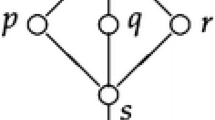Abstract
Equivalence relations and orderings are key concepts of mathematics. For those two relations, the formulation in fuzzy relations has been presented in the early days of fuzzy set theory. Utilizing the existing equivalence relations, we are unable to prove that fuzzy Zorn’s lemma and fuzzy axiom of choice are equivalent. The main objective of this research is to redefine the fuzzy-order relation with some fundamental properties. Also, introduce fuzzy equivalence relation based on our developed fuzzy-order relation and proved that any equivalence relation is equivalent to fuzzy equivalence relation. Furthermore, introduce the fuzzy versions of the axiom of choice, Zorn’s lemma, and well-ordering principle, such as the fuzzy axiom of choice, fuzzy Zorn’s lemma, and fuzzy well-ordering principle and discuss the relations between them. We proposed a fuzzy version of the Hausdorff maximal principle. Moreover, we give the application of fuzzy Zorn’s lemma in fuzzy ideals and fuzzy hausdroff maximal principle in fuzzy filters.
Similar content being viewed by others
References
Adnadjević D (1994) Dimension of fuzzy ordered sets. Fuzzy Sets Syst 67:349–357
Ahsan J (2012) Fuzzy semirings with applications. Springer Berlin Heidelberg, Berlin, pp 15–29
Beg I (1999) On fuzzy Zorn’s lemma. Fuzzy Sets Syst 101:181–183
Beg I (2012) On fuzzy order relations. J Nonlinear Sci Appl 5:357–378
Bentkowska U (2019) Properties of fuzzy relations and aggregation process in decision making. Iran J Fuzzy Syst 16:1–15
Bodenhofer U (1999) A new approach to fuzzy orderings. Tatra Mt Math Publ 16:21–29
Bodenhofer U (2000) A similarity-based generalization of fuzzy orderings preserving the classical axioms. Int J Uncertain Fuzziness Knowl Based Syst 8:593–610
Boixader D, Jacas J, Recasens J (2000) Fuzzy equivalence relations. In: Fundamentals of fuzzy sets, pp 261–290
Brown JG (1971) A note on fuzzy sets. Inf Control 18:32–39
Chakraborty MK, Das M (1983a) On fuzzy equivalence I. Fuzzy Sets Syst 11:185–193
Chakraborty MK, Das M (1983b) Studies in fuzzy relations over fuzzy subsets. Fuzzy Sets Syst 9:79–89
Chakraborty MK, Sarkar S (1987) Fuzzy antisymmetric and order. Fuzzy Sets Syst 21:169–182
Chapin EW (1975) Set-valued set theory. Notre Dame J Formal Log 16:255–267
Chon I (2009) Fuzzy partial order relations and fuzzy lattices. Korean J Math 17:361–374
Clark PL (2016) Well-ordered sets, ordinalities and the axiom of choice. Notes. Accessed February 1
Daňková M (2017) Fuzzy relations and fuzzy functions in fuzzy partial set theory. In: Advances in fuzzy logic and technology, pp 563–573
Dib KA, Youssef NL (1991) Fuzzy Cartesian product, fuzzy relations and fuzzy functions. Fuzzy Sets Syst 41:299–315
Gupta KC, Gupta RK (1996) Fuzzy equivalence relation redefined. Fuzzy Sets Syst 79:227–233
Lai H, Zhang D (2006) Fuzzy preorder and fuzzy topology. Fuzzy Sets Syst 157:1865–1885
Lee S, Lee KH, Lee D (2003) Order relation for type-2 fuzzy values. Tsinghua Sci Technol 8:30–36
Liu WJ (1982) Fuzzy invariant subgroups and fuzzy ideals. Fuzzy Sets Syst 8:133–139
Mukherejee TK, Sen MK (1987) On fuzzy ideals of a ring I. Fuzzy Sets Syst 21:99–104
Murali V (1989) Fuzzy equivalence relations. Fuzzy Sets Syst 30:155–163
Novák V (2019) Fuzzy type theory with partial functions. Iran J Fuzzy Syst 16:1–16
Rosenfeld A (1971) Fuzzy groups. J Math Anal Appl 35:512–517
S̆es̆elja B, Tepavc̆ević A (2003) Representing ordered structures by fuzzy sets. Fuzzy Sets Syst 136:21–39
S̆es̆elja B, Tepavc̆ević A (2007) Fuzzy ordering relation and fuzzy poset. In: International conference on pattern recognition and machine intelligence. Springer, pp 209–216
Tepavc̆ević A, Trajkovski G (2001) L-fuzzy lattices: an introduction. Fuzzy Sets Syst 123:209–216
Xin XL, Fu YL (2021) Fuzzy Zorn’s lemma with applications. Appl Math A J Chin Univ Ser B (Submitted to)
Xin XL, Zulqarnain M, Fu YL (2021) Fuzzy Berman–Kohler theorem and weak fuzzy ordered set. Iran J Fuzzy Syst (submitted to)
Zadeh LA (1965) Fuzzy sets. Inf Control 8:338–353
Zadeh LA (1971) Similarity relations and fuzzy orderings. Inf Sci 3:177–200
Zorn M (1935) A remark on method in transfinite algebra. Bull Am Math Soc 41:667–670
Acknowledgements
The authors are highly thankful to the Editor-in-chief and the referees for their valuable comments and suggestions for improving the quality of our paper.
Funding
This research is partially supported by a grant of the National Natural Science Foundation of China (Grant Number 11971384).
Author information
Authors and Affiliations
Contributions
The authors contributed to each part of this paper equally. The authors read and approved the final manuscript.
Corresponding author
Ethics declarations
Conflict of interest
The authors declare that they have no conflict of interest.
Human and animal rights
This article does not contain any studies with human participants performed by any of the authors.
Informed consent
Informed consent was obtained from all individual participants included in the study.
Additional information
Publisher's Note
Springer Nature remains neutral with regard to jurisdictional claims in published maps and institutional affiliations.
Rights and permissions
About this article
Cite this article
Zulqarnain, R.M., Xin, X.L. & Jun, Y.B. Fuzzy axiom of choice, fuzzy Zorn’s lemma and fuzzy Hausdorff maximal principle. Soft Comput 25, 11421–11428 (2021). https://doi.org/10.1007/s00500-021-06000-z
Accepted:
Published:
Issue Date:
DOI: https://doi.org/10.1007/s00500-021-06000-z




